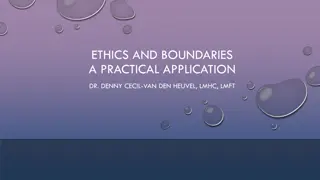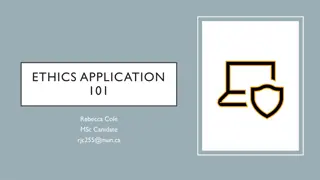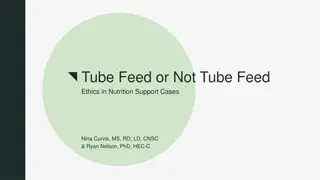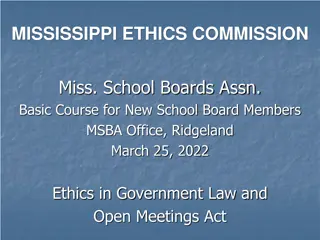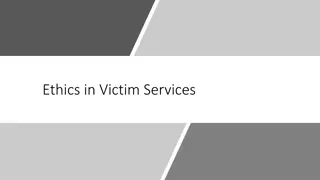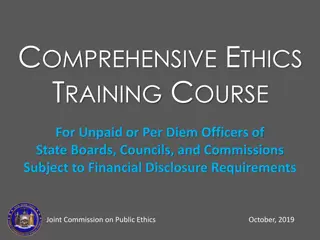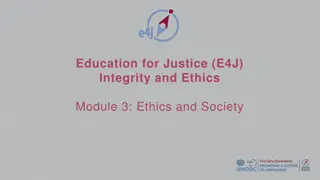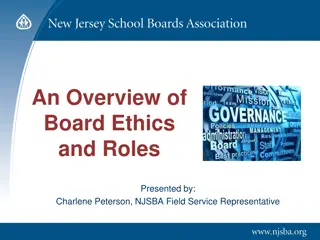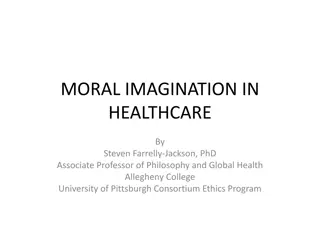
Ethical Standards for Advisory Committees: Ensuring Integrity and Accountability
Learn about the ethical standards guiding advisory committee members, emphasizing transparency, confidentiality, conflict of interest disclosure, and fair practices. Avoiding personal gains, discriminatory practices, and improper conduct is essential for upholding integrity in decision-making processes. Stay informed to comply with Washington State Ethics Law and contribute to a trustworthy academic environment.
Download Presentation

Please find below an Image/Link to download the presentation.
The content on the website is provided AS IS for your information and personal use only. It may not be sold, licensed, or shared on other websites without obtaining consent from the author. If you encounter any issues during the download, it is possible that the publisher has removed the file from their server.
You are allowed to download the files provided on this website for personal or commercial use, subject to the condition that they are used lawfully. All files are the property of their respective owners.
The content on the website is provided AS IS for your information and personal use only. It may not be sold, licensed, or shared on other websites without obtaining consent from the author.
E N D
Presentation Transcript
Advisory Committee Ethics Training 2024-2025
Washington State Ethics Law 42.52 RCW The focus and intent of this law is to ensure that Advisory Committee members, College Administrators, or Instructors are not the recipients of any personal or financial gain or private advantage; Through their role on the committee By fulfilling the responsibilities of their positions From the actions or votes of the Advisory Committee, or Through the efforts or outcomes of the program or the college. 1
Ethics Awareness This training is required for all Advisory Committee members by the State Board for Community Colleges. Chapter 4.40.20 of the SBCTC Policy Manual states that Advisory Committee training should include pertinent sections of the Washington Ethics Law as it pertains to their involvement with the college. WHY? Required for the Carl D. Perkins grant; this grant aims to improve the quality of technical education by providing funds to develop academic knowledge and technical skills for students. Referenced in the skills standards for College Faculty. 2
Ethical Standards for Advisory Committees 1. It is unacceptable to use confidential information obtained through your position on the advisory committee for personal gain. (RCW 42.52.050) 2. It is important to disclose any potential conflicts of interest arising from your involvement with the advisory committee. (RCW. 42.52.030) (RCW. 42.52.040) 3
Ethical Standards for Advisory Committees 3. Engaging in discriminatory practices, such as hiring based on race, gender, or nepotism, is not ethically permissible. (RCW.42.52.070) 4. It is unethical to endorse products or services during committee meetings without disclosing any financial interests you may have in those products or services. (RCW.42.52.160) 4
Ethical Standards for Advisory Committees 5. Sharing proprietary information from one organization with another organization without permission is unethical. (RCW 42.52.050) 6. It is not acceptable to accept gifts or favors from vendors or suppliers as a token of appreciation for your role on the advisory committee. (RCW 42.52.140) 5
Ethical Standards for Advisory Committees 7. It is unethical to manipulate data or statistics to present a more favorable picture of a program's performance. 8. It is important to prioritize transparency and honesty in all communications and interactions related to your role on the advisory committee. 9. It is unethical to disregard safety protocols or regulations if it means achieving a project deadline or cost-saving measure. 6
Is it ethical? An Advisory member of the baking committee sells commercial baking ovens. He convinces the committee that x brand of ovens is the most appropriate for the program. While he does not vote, he is aware that his company is the only company that sells the ovens locally. Is this an ethics violation? Public appointees must practice open and accountable government. When an important decision has been made in an advisory meeting, would it be ethical to request that opposing views be omitted from the minutes? Would insisting that students in Prof Tech programs participate in work site experiences only at businesses owned by advisory committee members be an ethics violation? 7
Thank you! You are critical to the success of our Professional-Technical programs as you work and offer advice on: Community Relations Community Resources Student Organizations Job Placement Staff Development Legislative Process Program Review Recruitment Curriculum Review and Updating 8
If you have further questions or concerns regarding this topic, or suspect a potential ethical conflict, please contact the Advisory Committee Coordinator at advisorycoordinator@clark.edu for support. 9

